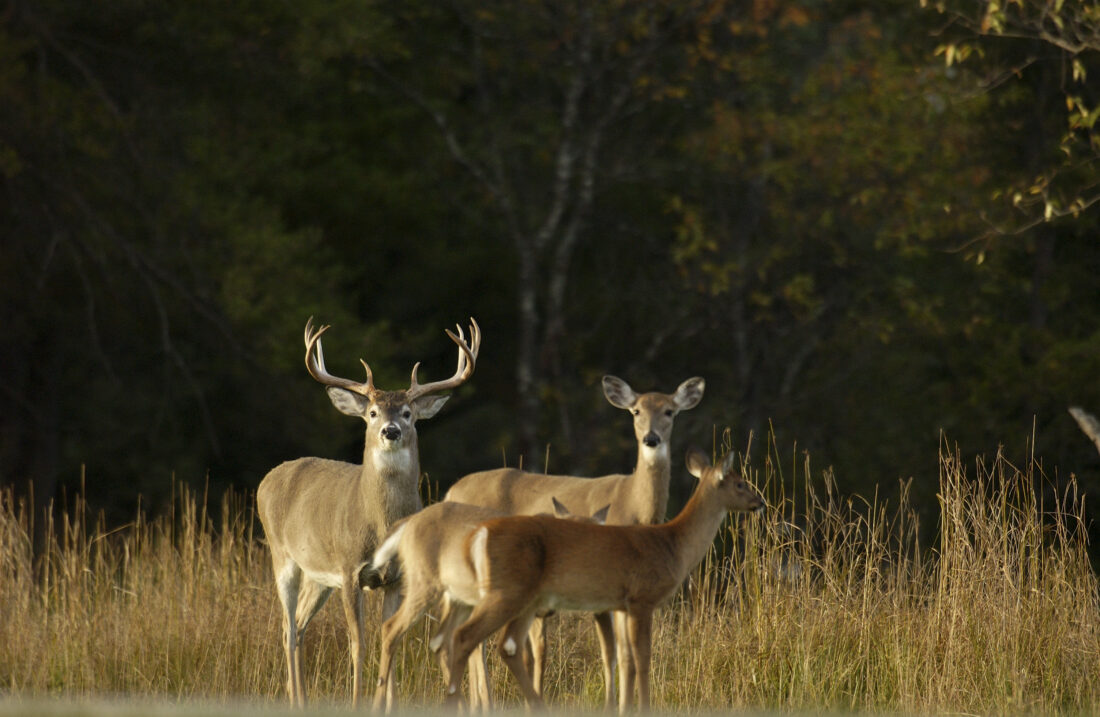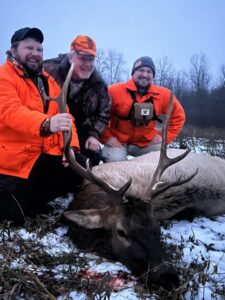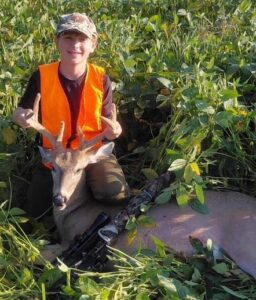DNR reminds Michigan hunters to follow best practices this firearm deer season

Courtesy Photo by the Michigan Department of Natural Resources (DNR) Whitetail deer are seen standing in a field.
Opening day of Michigan’s traditional firearm deer hunting season (Nov. 15) is right around the corner, and the Michigan Department of Natural Resources (DNR) urges hunters to follow best practices to avoid violations, in a recent press release.
Proper licenses and tags
The DNR states that hunters should purchase their license in enough time to receive tags in the mail. Before field-dressing or moving a deer, the DNR explains that kill tags must be filled out to include the month and date the deer was harvested, animal gender, and number of antler points, if any.
According to the release, kill tags must be properly placed on the deer by attaching the tag to a piece of string, wire, or a zip-tie that can then be attached to the deer. Conservation officers often see the wrong type of kill tag on game, such as fish or turkey licenses on deer. The DNR states that hunters can easily correct these mistakes by retagging the deer as soon as the error is noticed.
The DNR also explains that hunters need to report a deer within 72 hours of harvest.
Know and safely transport your firearm
According to the release, proper handling and transportation of a firearm are important habits to remain safe while hunting.
The DNR suggests that hunters take the time to familiarize themselves with their firearm and make sure it is properly sighted and functioning before a hunt. If it’s been a while since using a firearm, the DNR suggests hunters visit a local shooting range to practice.
When transporting a firearm, the DNR states that hunters should make sure it is unloaded in both the barrel and magazine, and enclosed in a case or carried in the trunk of a vehicle.
Know your target and what’s beyond it
According to the release, hunters are encouraged to familiarize themselves with the area they’ll be hunting, including where nearby buildings and properties are. Hunters cannot hunt with with a firearm within 450 feet of an occupied structure, which includes buildings, dwellings, homes, residences, cabins, barns, or structures used for farm operations unless they have permission from the landowner.
The DNR states that conservation officers investigate property damage caused by firearms every year. Rifle rounds travel long distances and hunters are responsible for where bullets end up.
Respect landowner rights
According to the DNR, hunters should respect posted “no trespassing” signs and property boundaries. If a deer runs onto private property, the hunter cannot retrieve it without the landowner’s permission.
If a hunter is hunting near someone’s property, the DNR encourages them to contact the landowner ahead of time instead of waiting till they are tracking game.
All hunting regulations apply on private property.
Share public land
The DNR also encourages hunters to research and scout the land they plan to hunt before opening day. Conservation officers often respond to confrontations over hunting spots, blocked roads, and illegal postings of “no trespassing” or “no hunting” signs on state-managed public land. Conservation officers say that hunter confrontations over hunting spots frequently occur due to last-minute hunters randomly picking their spots.
Tree stands and ground blinds on public land are are also considered “public,” according to the DNR. Regardless of who constructed or has tended to the blinds, when they’re on state-managed public land, the DNR states that they are available on a first-come, first-served basis.
Public land cannot be posted or reserved.
According to the release, a person placing a tree stand or ground blind that is left overnight on public land must have either their name, address, complete driver’s license number or their DNR Sportcard number affixed to the structure. Hunting platforms cannot be affixed or attached to any tree by nails, screws, or bolts.
Leave land better than you found it
The DNR encourages hunters to practice the “leave no trace” ethic and don’t litter. Whatever is brought into the woods must be taken back out, according to the release. Leaving propane bottles, hand-warmer wrappers, food wrappers, bottles, and other trash is illegal and may result in a fine.
“It is the responsibility of all people spending time outdoors to be good environmental stewards and clean up after themselves,” the release states.
Wear hunter orange
From Nov. 15 to 30, deer hunters, including those using archery equipment, are required by law to wear caps, hats, vests, jackets, or raincoats of hunter orange, according to the DNR. The orange must be worn on the outermost layer of clothing at all times and visible from all directions, regardless of whether hunters are on private or shared public land, even if hunting from within a blind.
The release states that hunter orange garments may have a camouflage pattern as long as the pattern is at least 50% hunter orange. The DNR recommends wearing as much hunter orange as possible to increase visibility to other hunters.
Know and follow baiting regulations
According to the DNR, deer baiting and feeding are banned in the entire Lower Peninsula. In the Upper Peninsula, baiting may occur from Sept. 15 to Jan. 1. Bait volume at any hunting site cannot exceed two gallons and bait must be spread on the ground and in an area that measures a minimum of 10 feet by 10 feet or its equivalent.
The release states that the mechanical spin-cast feeders are legal to use provided the feeder does not distribute more than the maximum volume allowed. On commercial forest land, bait must be brought in each night, unless the landowner has given permission.
The DNR encourages hunters to use bait sparingly to help curb the spread of diseases like bovine tuberculosis and chronic wasting disease.
Hunt in season and during legal hours
During firearm season, a hunter may legally shoot game starting 30 minutes before local sunrise and until 30 minutes after local sunset, according to the release. Anyone who witnesses or suspects hunting outside of legal hours should immediately call or text the DNR’s Report All Poaching hotline at 800-292-7800. Fast reporting makes it more likely that a conservation officer will identify the suspect.
Respect other hunters
The DNR states that Michigan law prohibits anyone from obstructing or interfering with the lawful taking of animals. Hunter harassment – when a person or organization intentionally sabotages another hunter’s quality opportunity to take game – is a misdemeanor offense. Examples include spraying repellent around a hunter’s blind, creating loud noises and/or barriers that prevent or deter a hunter or game from accessing an area, or destroying other hunters’ equipment such as trail cameras and blinds.





